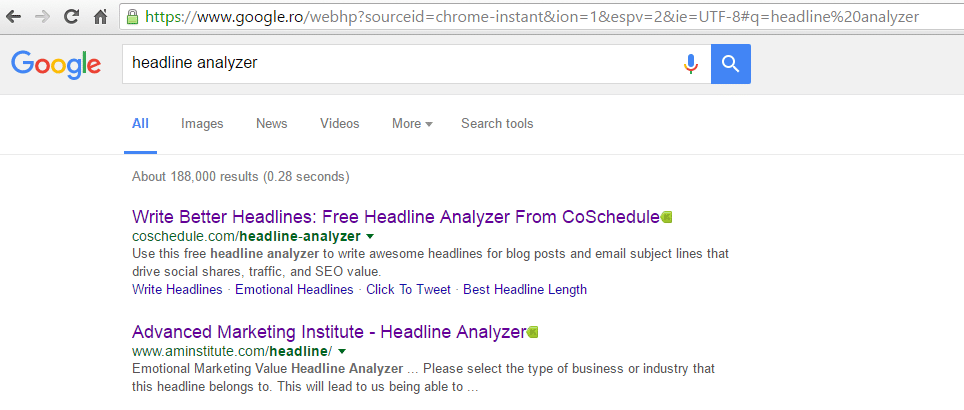Maximize output, improve workflow, assert your authority on Google. This is the competitive world of smart content, and tomorrow’s forecast is a word storm to beat all word storms before it. This is your cue to call in the headline analyzer. I know, it sounds worryingly similar to an IRS officer scooping through your tax return files, but far from it.
For your post to stand out in the ensuing chaos, it needs a good head. By that, I mean a strong, visible, assertive, addictive headline.
The Headline Analyzer is your personal emotional barometer
This free tool is the emotional ticker of your readers’ reactions. Bet you always wished for one as a child, especially when the adults around you were at constant odds with their feelings. Well, that era of uncertainty and confusion is over. Now, you can measure the Emotional Marketing Value of your chosen headline.
In addition, you are given a power reserved only for the chosen few of the copywriting world. You can decide which emotion to trigger in your readers by submitting your headline to a test.
I thought I should act as food tester, well, headline tester on your behalf, so I took a big breath and dived straight into it. I inserted the chosen title for this article into the headline analyzer.
But before I share the results, I’d like to run the title by you. Take a look at it. How do you respond to it? Does it arise your interest, concern, a shrug of the shoulders, a smile, a frown?
If you’ve read this deep into the article, I have my answer. David Ogilvy, Mad Men Don Draper’s source of inspiration and father of advertising, once described the habits of word customers.
On average, five times as many people read the headline as read the body copy. When you have written your headline, you have spent 80 cents out of your dollar.
We can only honor that old piece of wisdom with some modern day experimenting. So here are the results.
According to this headline analyzer, my EMV score is of 25%, somewhere around average, while the predominant emotion is spiritual. In other words, it appeals to people at a deep emotional level, less than at an intellectual or empathetic one.
Still, a second opinion can’t hurt. So I ran another check on the title, this time switching to a more popular online version of a headline analyzer. My grade is a green B+ or 67 points. Clearly, my headlines need some improving.
At this point, you might give up on the title and hope readers will not make a big fuss about a few words that only make for 1 percent of a more detailed, more informative text. Apparently, a series of studies done in 2014 reinforced the traditional view that first impressions matter.

Headlines are such first impressions. Consider your article a jittery interviewee in the waiting room of Google, expecting THE CALL. The reader will cast a first glance at its appearance and give a silent verdict. The headline, it turns out, is decisive.
Here is a list of whys:
- Attention span on battery – A recent experiment scored the average human attention span to 8 seconds. That means our ability to focus has dropped lower than that of a goldfish. Holding concentration has become a herculean task in the digital world. Your title needs to hook the reader and the headline analyzer is just perfect to turn your posts into terrific click baits.
- Filter through the Google webs – Getting a place on the search engine’s first page is an accomplishment worthy of… a hundred thousand thumbs up on Facebook, I’d assume. When you search for something on Google, you introduce the word in the random, usually grammatically incorrect way it comes to mind. When you decide which result to go by, you listen to what Google has to say. There it is. The title, a short excerpt and the URL stand out.
- Squeeze as much meaning as possible into as little space as possible – Your page title should be unique and preferably, a condensed Hemingway hors d’oeuvre in just 50- 65 characters. Google search results will crop it right around the 65 character mark.
- SEO – The acronym that beat NASA on everyone’s lips. Search Engine Optimization works in mysterious ways to rank your page, but one of the most important factors is the word recipe you use for your headline. If SEO deems it worthy for the podium of the advanced marketing Olympic games, then you are a winner. The headline analyzer is just a supporting fan.
As long as people emotionally respond to linguistic stimuli, your title determines how well you rank on the content market. It’s hard as it is to meet the guidelines for concise and easy to scan content. It’s even harder to summon it all under the wings of the headline.
The terms we use to enforce the concept of a good title might sound futuristic, so much so that there’s a slim chance you won’t find them in this year’s edition of the Oxford dictionary. Still, this phenomenon dates way back into the times of the printing press.
Shakespeare couldn’t have created a more enduring title than ‘Romeo and Juliet’. Even ideologies, wars or NATO-backed operations need catchy headlines to draw in mass attention. In the 1940s, the British Press came with a paranoia-inducing name for the heavy bombing raids carried out over Britain by the Germans that still darkens any conversation to this day- the Blitz.
In June 1945, the USA launched Operation Magic Carpet to fly over eight million Americans back home at the end of the war.
These titles carved their place in the everyday vocabulary, and I wonder what kind of headline analyzer were their creators using at the time. One thing is for certain. Nowadays, you won’t get too much of a headache trying to come up with the perfect title.
Image source: 1.

